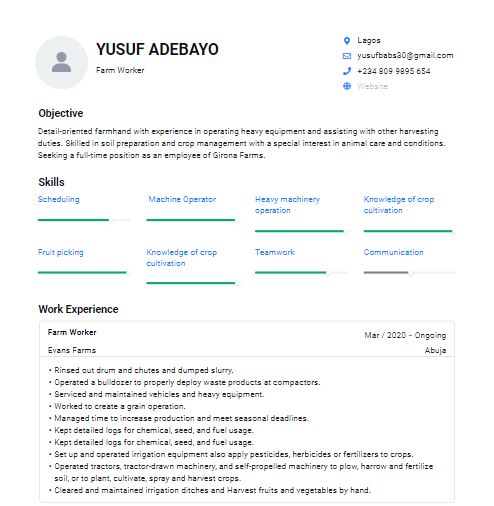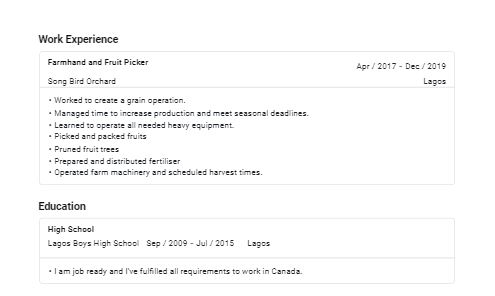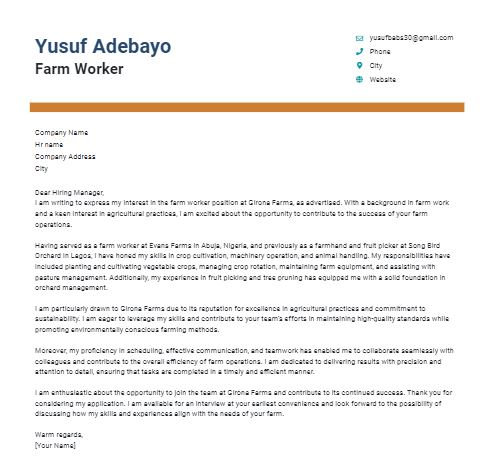Dear Immigrant, welcome to Canada, a land of diverse opportunities! As an experienced job consultant, I’m here to guide you through finding employment in Canada without a traditional degree. Let’s embark on this journey together.
Understanding the Canadian Job Market
Identify High-Demand Sectors
The Canadian job market is dynamic, offering opportunities across various industries. It’s crucial to identify sectors with a high demand for workers, as this can significantly increase your chances of employment.
Here are some high-demand sectors in the Canadian job market:
- Trades and Construction: With ongoing infrastructure projects and a growing need for housing, tradespeople like electricians, plumbers, and carpenters are in high demand. Look into apprenticeship programs, which are a great way to enter these professions.
- Healthcare: Canada’s healthcare system is robust, but there’s a constant need for more professionals, especially in home care and long-term care sectors. Positions like personal support workers (PSWs) and licensed practical nurses (LPNs) are often available and crucial, especially with an aging population.
- Technology: The tech industry in Canada is booming, with a particular need for software developers, IT specialists, and cybersecurity experts. Even without a degree, certifications and proven skills in programming languages or systems can open doors.
- Service Industry: The service sector, including retail, hospitality, and customer service, often offers opportunities that require more personality and soft skills than formal education.
- Agriculture: Canada’s vast agricultural sector provides seasonal and full-time opportunities, from farm labor to specialized roles in agri-business.
Recognize the Value of Skills and Experience
In Canada, your hands-on skills and previous work experience can be just as valuable as formal education, if not more so, in many fields.
To leverage your skills and experience in Canada, do the following:
- Document and Articulate Your Skills: Make a comprehensive list of all your skills, especially those that are transferable to various jobs. Be prepared to discuss how these skills can benefit your potential employer.
- Highlight Your Achievements: Whether in previous jobs, volunteer roles, or even personal projects, your achievements can demonstrate your capabilities. Quantify these achievements when possible (e.g., “increased sales by 20%” or “managed a team of 10”).
- Continual Learning: Show a commitment to continuous learning by taking relevant courses, attending workshops, or earning certifications in your field of interest. This demonstrates initiative and adaptability, qualities highly valued by Canadian employers.
- Leverage Your Network: Often, your network can provide insights into industry demands and introduce you to potential employers. Don’t hesitate to reach out to contacts in your desired field to gather information and seek advice.
- Prepare a Canadian-Style Resume: Canadian employers prefer concise resumes focused on skills and achievements. Tailor your resume for each job application, emphasizing how your background aligns with the job requirements.
Preparing Yourself for the Job Market
Assess Your Skills and Interests
Take time to list your skills and interests. Are you good with tools, enjoy helping others, or have a knack for technology? Your career path in Canada can align with these strengths. This self-knowledge will serve as a compass in your job search.
Upgrade Your Skills
Canada offers various courses and certifications that can enhance your skills. For example, a certification in plumbing can be invaluable if you’re interested in trades. Look for reputable institutions that offer these programs. Remember, the goal is to make your skillset relevant to the Canadian job market.
Improve Your Language Skills
Fluency in English or French is critical in Canada. If you need to improve, consider enrolling in language classes. Many community centers offer these at low cost or even for free. Being proficient in one of Canada’s official languages will significantly improve your employability.
Understand Canadian Workplace Culture
Canadian workplaces might differ from what you’re used to. They often emphasize teamwork, punctuality, and communication. Familiarize yourself with these norms. You can find resources online or attend workshops to better understand Canadian workplace culture.
Finding Job Opportunities That Do Not Need a Degree in Canada
Utilize Job Search Platforms
Digital platforms are a primary source for job listings. Regularly browse sites like Indeed and Canada’s Job Bank. Set up alerts for jobs that match your profile. This way, you won’t miss out on new opportunities.
Network Actively
Networking is key in Canada. Attend job fairs and industry meetups in your area. Engage with professionals on LinkedIn by joining groups related to your field. Networking can open doors to opportunities not advertised publicly.
Consider Internships or Volunteer Work
These positions can provide valuable Canadian experience. They’re also a chance to showcase your skills to potential employers. Even unpaid roles can lead to job offers or valuable references.
Look into Apprenticeships
For trades, apprenticeships are an excellent pathway. They combine learning with working, allowing you to earn while gaining Canadian work experience. Check the Canadian Apprenticeship Forum for opportunities.
Applying for Jobs in Canada
Before we discuss how to apply for jobs, I’d like to let you know there are about 15 jobs in Canada that do not need a degree. To apply for any of these jobs, click on your desired job below to take you to job application page.
To successfully apply for jobs in Canada without a degree, do the following:
1. Craft a Canadian-Style Resume
Canadian resumes are typically concise and focus on achievements. Use bullet points to highlight your accomplishments. Tailor your resume for each application, emphasizing relevant experience and skills.
Canada Resume Template and Sample for Jobs That Do Not Require a Degree
Following a sample or template when writing a resume for a Canadian job can help you create a standard resume and increase your efficiency in the writing process. Below is a basic template you can follow for writing your Canadian resumes:
Canada Resume Template
Full name
[Location] | [Email address]| [Phone number] | [Optional website]
Professional Summary
[Write a professional summary here.]
Work History
[Job title]
[Company name], [Company location]
[Dates of employment]
[Job duty]
[Job duty]
[Job duty]
[Job duty]
[Job duty]
[Second job title]
[Company name], [Company location]
[Dates of employment]
[Job duty]
[Job duty]
[Job duty]
Education
[Degree]
[School name], [School city and state]
[Year of graduation]
[GPA or awards optional (only if they’re a recent graduate)]
Skills
[List six to ten skills in this section]| Skill | Skill | Skill | Skill | Skill | Skill
Canadian Resume Example
Yusuf Adebayo
Ikorodu, Lagos | yusufadebayo@email.com | +234 809 9895 654
Professional Summary
Detail-oriented farmhand with experience in operating heavy equipment and assisting with other harvesting duties. Skilled in soil preparation and crop management with a special interest in animal care and conditions. Seeking a full-time position as an employee of Girona Farms.
Work History
Farm Worker
Evans Farms, Abuja, Nigeria
March 2020-current
Plant and cultivate vegetable crops
Manage crop rotation
Maintain farm equipment
Prune vegetation
Assist with pasture management.
Farmhand and Fruit Picker
Song Bird Orchard, Lagos, Nigeria
April 2017-December 2019
Picked and packed fruits
Pruned fruit trees
Prepared and distributed fertiliser
Operated farm machinery and scheduled harvest times.
Education
High School
Lagos Boys High School
2017
Skills
Scheduling | Heavy machinery operation | Knowledge of crop cultivation | Animal handling | Teamwork | Communication.


Write a Compelling Cover Letter
Your cover letter should tell a story. Explain why you’re interested in the role and how your background makes you the perfect candidate. Be sincere and avoid generic phrases.
Cover Letter Template for Canadian Jobs That Do Not Need a Degree
[Your Name]
[Your Address]
[City, Province, Postal Code]
[Your Email Address]
[Your Phone Number]
[Date]
Hiring Manager
Girona Farms
[Farm Address]
Ontario, Canada
[City, Postal Code]
Dear Hiring Manager,
I am writing to express my interest in the farm worker position at Girona Farms, as advertised. With a background in farm work and a keen interest in agricultural practices, I am excited about the opportunity to contribute to the success of your farm operations.
Having served as a farm worker at Evans Farms in Abuja, Nigeria, and previously as a farmhand and fruit picker at Song Bird Orchard in Lagos, I have honed my skills in crop cultivation, machinery operation, and animal handling. My responsibilities have included planting and cultivating vegetable crops, managing crop rotation, maintaining farm equipment, and assisting with pasture management. Additionally, my experience in fruit picking and tree pruning has equipped me with a solid foundation in orchard management.
I am particularly drawn to Girona Farms due to its reputation for excellence in agricultural practices and commitment to sustainability. I am eager to leverage my skills and contribute to your team’s efforts in maintaining high-quality standards while promoting environmentally conscious farming methods.
Moreover, my proficiency in scheduling, effective communication, and teamwork has enabled me to collaborate seamlessly with colleagues and contribute to the overall efficiency of farm operations. I am dedicated to delivering results with precision and attention to detail, ensuring that tasks are completed in a timely and efficient manner.
I am enthusiastic about the opportunity to join the team at Girona Farms and contribute to its continued success. Thank you for considering my application. I am available for an interview at your earliest convenience and look forward to the possibility of discussing how my skills and experiences align with the needs of your farm.
Warm regards,
[Your Name]

Prepare for Interviews
Research common interview questions in your field. Practice your responses, focusing on your achievements and how you can contribute to the company. Dress appropriately and arrive on time for your interview.
Understand Canadian Employment Laws
Know your rights as a worker in Canada. This includes understanding the minimum wage in your province, work hours, and health and safety standards. The Government of Canada’s website provides valuable information on labor laws.
Leveraging Government and Community Resources
- Explore Government Programs: Canada offers various programs to help immigrants find jobs. These include settlement services, which provide job search assistance, and bridging programs, which help you get Canadian credentials in your field.
- Connect with Immigrant Services: Many communities have organizations dedicated to helping immigrants. They offer personalized support, from resume writing to interview preparation. Take advantage of these resources.
- Attend Job Search Workshops: These workshops can provide insights into the Canadian job market. They cover everything from resume writing to effective job search strategies. Many of these workshops are free.
Staying Positive and Persistent
- Be Patient: Finding the right job can take time. Keep applying and don’t get discouraged by rejections. Each application is a step closer to your goal.
- Seek Support When Needed: Job hunting can be overwhelming. If you’re feeling stuck, reach out for help. Talk to friends, family, or professionals at immigrant services. You’re not alone in this journey.
- Celebrate Your Achievements: Acknowledge every milestone, no matter how small. Got an interview? That’s progress. Received positive feedback? That’s a win. Celebrating these moments can keep you motivated.
Actionable Tips for Success in Finding Jobs in Canada Without a Degree
- Embarking on a job search in Canada without a degree is a journey filled with opportunities for growth and success. The Canadian job market is dynamic and values diverse skills and experiences. By understanding the market, preparing yourself, finding opportunities, applying effectively, leveraging resources, and maintaining a positive outlook, you are setting a strong foundation for your career in Canada.
- Remember, your unique background, skills, and life experiences are invaluable assets in the diverse Canadian workforce. Many immigrants and foreigners have forged successful careers in Canada without holding traditional degrees by showcasing their skills, adaptability, and willingness to learn.
- Stay informed about the industries thriving in Canada and be ready to adapt to new environments and challenges. Continuous learning and skill development are key, so embrace opportunities for professional growth, whether through formal training, workshops, or real-world experience.
- Networking remains one of the most effective ways to uncover job opportunities. Build and maintain professional relationships, as these connections can provide support, advice, and potentially lead to job offers. Don’t underestimate the power of community; engage with local groups and organizations related to your field of interest.
- When applying for jobs, pay close attention to crafting tailored resumes and cover letters that speak to the needs and culture of Canadian employers. Highlight your achievements, skills, and how you can contribute to the prospective employer’s success. Prepare diligently for interviews, focusing on conveying your strengths and fit for the role with confidence and clarity.
- Navigating Canadian employment laws and workplace culture is crucial for integrating into the job market successfully. Understanding your rights and responsibilities as an employee ensures you can advocate for yourself and contribute positively to your workplace.
- Lastly, the journey to employment in Canada is a marathon, not a sprint. Patience, resilience, and a positive attitude are your greatest allies. Celebrate each step forward and learn from every experience. Support is available, from government programs to community organizations, so don’t hesitate to seek out resources designed to assist immigrants and foreigners in their career pursuits.
Conclusion
While finding a job in Canada without a degree presents its challenges, it is far from impossible. With the right approach, preparation, and mindset, you can uncover a wealth of opportunities that align with your skills and aspirations. Canada’s inclusive and dynamic job market is ready to welcome you, so embrace the journey with confidence and optimism.
